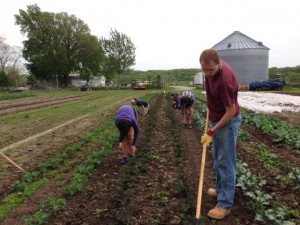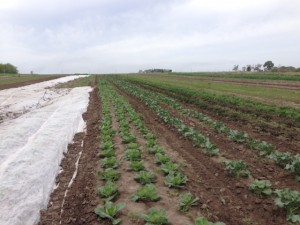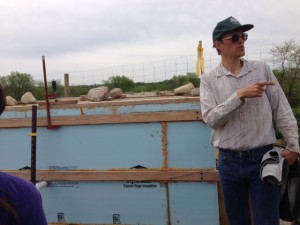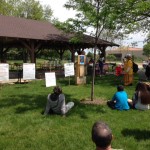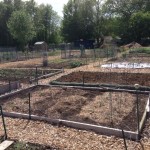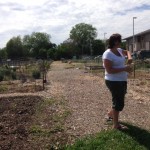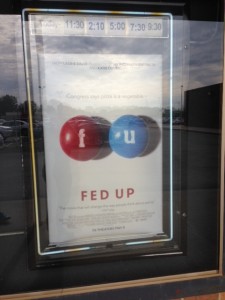I believe that today could arguably have been our longest, leaving at 8:30 in the morning and not getting back until almost 9:00 at night. We began the day by going to Table Top Farms, an organic-oriented CSA farm on a slightly larger scale than the Wallace Country Center. Dr. HN wanted us to visit this farm not simply because of the organic practices, but more so for the business practices and the narrative behind it. The farm is run by Luke and Sally Gran, a young couple in their mid to late 20s, and they only started it a few years ago. Yet even despite working on rented family land, they still struggled to get their farm up and running. Although I didn’t quite understand some of the technicalities of their venture, I did manage to pick up a few points. If you want to start a farm:
1) Have a plan. They showed us a five-year plan that they created along with another couple (who later left) outlining their goals and strategies for growth.
2) Get loans. Starting a farm requires a tremendous upfront cost, which most beginning farmers do not have. Therefore, you need to get a loan. Obtaining a loan from a bank for an organic operation is often difficult, but there are options through the Department of Agriculture’s loan programs, particularly when you are a beginning or younger farmer. However, banks require some kind of confidence that your venture will succeed, so you need to show them a plan for growth (see number 1).
3) Know your government. There are many grants programs for minority and beginning farmers, otherwise known as the “socially disadvantaged.” Additionally, the new Farm Bill includes new benefits for beginning, small, and organic farmers. Luke, the finance manager, said that most of their net profit came from government assistance. As mentioned earlier in the blog, this kind of narrative is actually common for many farmers, conventional or not.
4) Know your community. It is best to know your neighbors, community farmers, and your customers. In general, it is best to get to know those around you, but, if you have a problem, there is a 99.9% chance that a farmer close by will know how to fix it. Both Luke and Sally said that they’ve received a huge amount of help from other farmers, which was especially helpful since they didn’t have much experience in farming when they started Table Top. They will teach you how to farm better, fix your machines, and get to know your land.
5) Be patient. Trying to build up a successful farm, especially an organic one, is a painfully slow process, and it is all about trial and error. Each growing season is different, and the circumstances for your farm can change overnight, for the better or worse.
We learned all of this in the process of touring the farm and weeding the kale. We used some kind of specialized gardening hoes and thus had to be careful to not rip up the plants. Although I accidentally ripped off a leaf or two, I did not do near as bad as Dr. HN who managed to rip up an entire plant.
Next, we went to Des Moines to attend March Against Monsanto. Monsanto is one of the biggest agricultural seed and technology companies in the world and is very much supportive of GMOs and the use of chemicals, many of which it produces. Unfortunately, we misled ourselves into thinking we were attending a large protest rally type deal, when we were actually attending this. It was more of a community awareness get-together, or as Cecily said as we were looking for the protest, “I can’t tell if that’s a birthday party or the protest.” The event largely centered around getting to know what is in your food. There were a series of four speakers: one cautioning against the use of chemicals because of health risks, a beekeeper telling about neonicotinoids (an insecticide that has been linked to bee deaths), a man for the Polk County Conservation Board, and Sherrie Taha, a woman running for Iowa Secretary of Agriculture. Overall, the closest we got to anarchy was building “seed bombs,” balls of papier mache with flower seeds rolled it that you through in an empty lot of your choosing. I wanted pepper spray.
- Our seed bombs.
- Those are recipes, not protest signs. Really.
- WHERE’S THE OUTRAGE?!?!
After listening to them speak, we were given a tour of an urban garden. The premise behind this is that members of the community who lack garden space in their own homes can rent small plots in this garden to grow their own produce. I thought it was a neat idea to branch out and build the community around something healthy and productive.
- The modest plots.
- Overview of the urban garden.
Finally, we had to scooch on over to what looked to be a small, independent cinema house, named Fleur Cinema, to watch Fed Up. This is a new documentary narrated by Katie Couric about the obesity epidemic, what caused it, and how to fix it. To keep it short, the main argument is that clever marketing of processed foods with hidden and unhidden sugars is tricking us into eating more foods with lower fat and calories, even while we still gain more weight. Therefore, you need to eat as little processed foods as possible. Much of the attacks attacked the food establishment and the politics surrounding it. Although it practically dismissed the importance of exercise, I think the movie played towards my overall philosophy towards eating that it is not so much the amount you eat, than it is what you eat that causes problems. Nonetheless, I greatly enjoyed the film, and it brought up a lot of great points.

